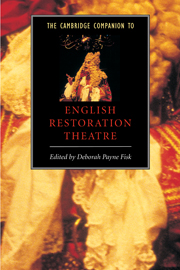Book contents
- Frontmatter
- 1 The theatre
- 2 The performance
- 3 Adaptations and revivals
- 4 Comedy
- 5 Tragedy
- 6 Tragicomedy
- 7 Farce
- 8 Restoration and settlement
- 9 Change, skepticism, and uncertainty
- 10 Drama and political crisis
- 11 Spectacle, horror, and pathos
- 12 Gender, sexuality, and marriage
- 13 Playwright versus priest
- 14 The canon and its critics
- Biographies and selected bibliography
- Index
7 - Farce
Published online by Cambridge University Press: 28 May 2006
- Frontmatter
- 1 The theatre
- 2 The performance
- 3 Adaptations and revivals
- 4 Comedy
- 5 Tragedy
- 6 Tragicomedy
- 7 Farce
- 8 Restoration and settlement
- 9 Change, skepticism, and uncertainty
- 10 Drama and political crisis
- 11 Spectacle, horror, and pathos
- 12 Gender, sexuality, and marriage
- 13 Playwright versus priest
- 14 The canon and its critics
- Biographies and selected bibliography
- Index
Summary
The problem of farce
If one believes the column in Annals of English Drama which defines the “Type” of each play listed, Thomas Otway's The Cheats of Scapin (1677) ought to be the first English farce. Whatever else may be distinctive about Otway's play, it seems inherently improbable that it could claim that honor. But perhaps it is no honor: the naming of a work as a tragedy is construed as a label of dignity, an attempt to lay claim to an elevated cultural position and a network of weighty cultural resonances within which the work demands to be deemed worthy of a place; the naming of a work as a farce is more likely to be accompanied by an apology. When Leo Hughes and A. H. Scouten edited a collection of ten Restoration and eighteenth-century farces, their preface immediately set out to answer any accusation that they thought the plays good: “We have no illusions about the intrinsic merit of these little pieces. There is no great literary merit to be found in any one of them. In fact, their significance lies not so much in their merit as in their popularity.” Restoration playwrights would have had no difficulty understanding their point of view. Again and again, throughout the Restoration and long before the appearance of The Cheats of Scapin, Restoration dramatists sought carefully to define their own work as not being farce, a scrupulous resistance to the triviality that they too assumed to be inherent in the form, a resistance as necessary in the 1660s as in the 1940s.
- Type
- Chapter
- Information
- The Cambridge Companion to English Restoration Theatre , pp. 107 - 126Publisher: Cambridge University PressPrint publication year: 2000
- 2
- Cited by

